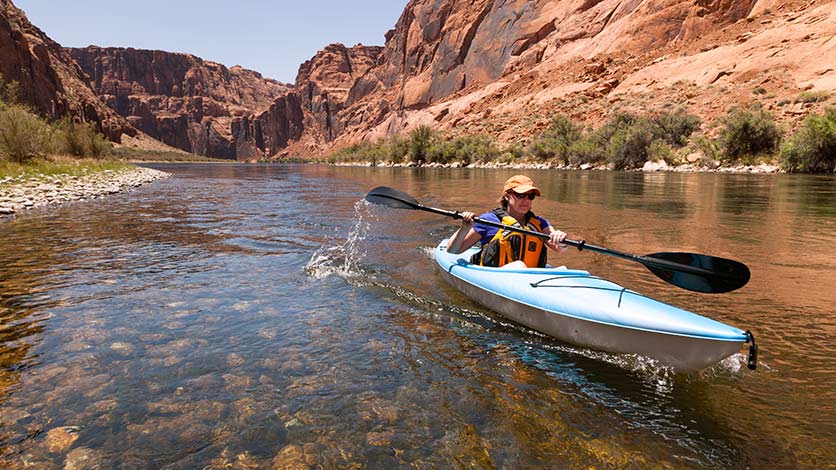Clinical Mental Health Counseling MA
Nature-Based Transpersonal Counseling Concentration
Embark on a transformative journey through experiential classroom learning, nature-based practices, contemplation, and nature retreats. You will integrate theory with practice as you deepen your connection to the natural world.
Over the course of this three-year master’s degree in Clinical Mental Health Counseling, you’ll join a cohort of graduate students with whom you will share life experiences, create community spirit, and build personal and professional relationships in a bold and authentic learning environment.
About this Concentration
The focus of this concentration is a belief in the healing power of nature. Building on the skills and dispositions learned throughout the Clinical Mental Health Counseling program, graduates can enact their desire to be of service to others. This concentration values experiential learning within a community.
Join us and become a leader in the field of healing, where you will learn to weave together nature, mindfulness, and compassionate care to make a difference in the world.
The Nature-Based Transpersonal Counseling concentration focuses on four core areas:
Coursework that covers the Clinical Mental Health Counseling and theoretical knowledge needed for licensing in most states.
Training in therapeutic techniques that can be employed in and out of the traditional counseling room.
Incorporation of meditation and body awareness practices throughout the program.
A hands-on 9- to 12-month internship to gain practical experience.
Learn in Community
Students in the Nature-Based Transpersonal Counseling Concentration move through their studies as a cohort. Through rich interpersonal exchanges, students gain increased awareness of their patterns and the ways they impact and are impacted by others. Students learn to consider other perspectives and develop tools for acknowledging and addressing power differentials, co-creating spaces of mutual bravery and vulnerability.
Unmatched Training Experience
The uniqueness of this concentration offers students learning activities (e.g., lectures) outside in Boulder Valley, the front range, the Rocky Mountains, and the Utah Canyons. Students engage in an approximately one-week-long camping trip per semester.
These trips, along with day trips, enhance students’ skills through immersive experiences in nature. Trained faculty will support you to safely experience a range of nature-based activities and interventions, including camping, backpacking, rock climbing, canoeing, animal-assisted therapies, and horticulture. On day trips to urban and rural parks, gardens, and farms, you will practice mindfulness in nature, learn about local land history and ecology, engage in reciprocal caretaking of the land, and practice facilitation skills.
Students are introduced to advocacy, i.e., the logistical, financial, and cultural constraints that may prevent people from accessing land. We explore approaches to address this. You will also be guided to explore the impacts of the climate crisis and environmental injustices while gaining skills to address the growing disconnect between humans and nature.
Hybrid Internships
During your third and final year, you’ll complete a clinical internship and provide invaluable practical training and experience. Students are responsible for securing their internship sites and may partner with a vast array of traditional and non-traditional sites along the front range of Colorado and across the United States. Past interns have gained clinical experience interning at schools, equine-assisted therapy centers, residential treatment facilities, wilderness therapy programs, community mental health centers, and other counseling organizations.
To grant you the flexibility to find an internship that best matches your interests, some of your courses will be online beginning in the summer of your second year. During the Internship, you will visit campus a minimum of one time per semester.
Introspective Approach
Quick Facts
- On-campus degree for first 2 years; hybrid for Internship year.
- 6 week-long camping trips plus field days to learn how to work creatively in a range of settings.
- Hands-on experience with nature-based modalities like equine-assisted therapy, horticulture, rock climbing, canoeing, and hiking.
- Opportunities to experience and practice nature-based techniques that can be used with diverse populations in clinical, office-based settings and beyond.
- A personal rite of passage prepares students for the transition into more professional roles.
- Now Accepting Applications for August 2025
Program Format
The MA in Clinical Mental Health Counseling program focusing on Nature-Based Transpersonal Counseling is a three-year program blending clinical and theoretical coursework in clinical mental health counseling, contemplative practice, and nature-based counseling.
Supported by Buddhist, transpersonal, and earth-based thought and practice, the program is grounded in the belief that we inherently belong and are interconnected with all life.

Course Spotlight
Psychology of Meditation: Foundations of Mindfulness
Degree
Requirements
The Nature-Based Transpersonal Counseling concentration is a 66-credit, three-year, experiential, interdisciplinary, and culturally diverse program that offers graduate students a comprehensive blend of counseling and nature-informed therapeutic expertise. At the crossroads of counseling, ecopsychology, and mindfulness, this master’s degree is a transformative journey of self-discovery, skill development, and service.
Counseling Experiential Requirement:
Each student must participate in a counseling/therapy relationship with a qualified psychotherapist of their choice. A minimum of fifteen 50-minute face-to-face sessions (via telehealth or in person) within the first two years of the program is required. (The term “psychotherapist” is used to be inclusive of licensed providers from a variety of professional mental health backgrounds. The Student Guidebook outlines specific parameters of a qualified psychotherapist.)
Course Schedule
Fall Year 1 (12 credits)
- CNSN 610, Nature Based Counseling I: Foundations (1)
- CMHC 600, Foundations and Orientation of Clinical Mental Health Counseling (3)
- CMHC 602, Human Growth and Development (3)
- CMHC 606, Legal and Ethical Aspects of Counseling (3)
- CNST 622, Psychology of Meditation (2)
Credits: 12
Spring Year 1 (13 credits)
- CNSN 612, Nature Based Counseling II: Theory in Practice (2)
- CMHC 603, Counseling and Helping Relationships I (3)
- CMHC 601, Social/Multicultural Foundations (3)
- CMHC 605, Group Counseling (3)
- CNST 721, Cultivating Mindful Presence (2)
Credits: 13
Fall Year 2 (11 credits)
- CMHC 604, Counseling and Helping Relationships II (3)
- CMHC 608, Assessment (3)
- CNSN 621, Person/Plants/Land: Horticulture in Counseling (1)
- CNSN 620, Nature Based Counseling III: Connection & Disconnection (1)
- CNSN 622, Family Systems (3)
Credits: 11
Spring Year 2 (10 credits)
- CMHC 620, Counseling Practicum (3)
- CMHC 607, Diagnosis & Treatment Planning (3)
- CNSN 630, Nature-Based Facilitation (2)
- CNSN 626, Transitions Through the Lifespan (2)
Credits: 10
Summer Year 2 (6 credits)
- CMHC 610, Career Development (3)
- CMHC 621, Initial Internship (2)
- CNSN 631, Contemplative Perspectives & Practice (1)
Credits: 6
Fall Year 3 (7 credits)
- CMHC 622, Internship I (3)
- CMHC 615, Capstone I (1)
- CNSN 632, Crisis, Trauma & Disaster Counseling (3)
Credits: 7
Winter Intersession Year 3 (0 credits)
- CMHC 623, Winter Intercession Internship (0)
Spring Year 3 (7 credits)
- CMHC 624, Internship II (3)
- CMHC 616, Capstone II (1)
- CMHC 609, Research & Program Evaluation (3)
Credits: 7
Why Choose Naropa?
Learn in Relationship with Others and the Natural World
Over the course of three years, students are supported to develop relationships with fellow cohort members, while also engaging in reciprocal relationships with the more-than-human world.
Contemplative Education
We augment the traditional counseling curriculum with additional teachings and experiences, including Earth-based practices that support individual and collective wellbeing.
Career Readiness
Our students learn how to work creatively with the tools and resources at hand and to make use of the natural metaphors that we as humans intuitively understand.

How this Program Prepares You
Internship Outcomes
In the final year of your graduate degree program, you will serve as a supervised intern in a community agency, gaining crucial experience in a specialty area such as addiction counseling or crisis intervention. Throughout the internship, you’ll be supported by on-site supervision, faculty mentorship, and career development counseling.
Diverse Fields of Learning
Naropa’s master’s in Nature-Based Transpersonal Counseling degree is one-of-a-kind. Integrating classroom learning, hands-on experience, and contemplative practice, students will gain knowledge in a wide array of fields, from ecopsychology to outdoor therapy and leadership.
Introspective System
A foundational belief of this experiential program is that understanding and working with others begins with an ability to understand and work with oneself. Moving through the cohorted program, students learn to be mindful of their own reactions as well as their impact on others. They are supported to approach challenges in a compassionate way that reduces the tendency to pathologize the self and others. Finally, they are encouraged to reflect upon and, where appropriate, share their own experiences in the world, thus learning how to create and maintain spaces of mutual bravery and vulnerability.
Learning Outcomes
Students demonstrate the ability to effectively incorporate nature-based approaches into counseling.
Students demonstrate an understanding of how culture and social structures influences the human-nature relationship.
Career Opportunitites for Nature-Based Transpersonal Counselors
The master’s degree in nature-based counseling combines elements of psychology and spirituality. At its core, it offers an intensely experiential, interdisciplinary, and multicultural approach, equipping graduate students with diverse counseling and nature-informed experiences.
From agency to private practice to wilderness therapy programs, our Nature-Based Transpersonal Counseling concentration unlocks diverse career paths in mental health, education, and beyond. Our graduates bring their unique perspective to their work in agency, non-profit, and private practice settings, as well as in groundbreaking programs in horticulture, animal therapy, and outdoor experiences.
- Mental Health Counselor: provide therapeutic support for emotional wellbeing.
- Substance Abuse Counselor: aid in addiction recovery.
- Behavioral Disorder Counselor: assist with behavioral challenges.
- Social Service Assistant: support individuals accessing social services.
- Equine-Assisted Counseling: partner with horses to facilitate therapeutic sessions.
Discover Career Pathways for Nature-Based Transpersonal Counselors
Hear from a Graduate
Faculty Highlight
FAQS about
Nature-Based Transpersonal Counseling
What makes Naropa’s nature-based transpersonal counseling program unique?
Graduates of our program don’t just receive a certificate tacked on to their counseling degree. Regular outings and a weeklong intensive each semester take students outside of the classroom, where they are able to practice nature-based therapeutic interventions while deepening their own connection to nature. These interactions will resource you personally and provide you with the experience, tools, and confidence to lead innovative and effective counseling sessions in a wide array of settings. The experiential and contemplative aspects of the program contribute to counselor success and longevity in the field.
Learn more about nature-based transpersonal counseling in our suggested reading list for this program.
Why the name change? What happened to the Transpersonal Wilderness Therapy program?
In 2024 we announced a name change. The new name suggests a shift away from more rugged, adventure-based interventions toward practices that are accessible to a wider range of people. While in Colorado, our towering peaks and wide-open plains beckon, we recognize that many potential counselors and clients find their access to wilderness limited by geographic, financial, physical, and cultural constraints.
From the inception of the Transpersonal Wilderness Therapy program in 2002, our faculty and graduates have resisted the notion that nature lies outside of us and can mostly be experienced in wilderness, a place where, by definition, humans don’t really belong. Our new name recognizes that we are always seated firmly in nature. Grounded in our physical body, we belong to this world, and the world belongs to us–not to be dominated but to be cared for and appreciated. This sense of belonging is essential to our mental and physical health.
Read more about the name change.
What outdoor skills do you need to participate in this program?
Prospective students should be confident that they can safely tend to their needs while learning in a dynamic, outdoor environment. Participation in the field sections requires knowledge of wilderness travel, campcraft, and leave-no-trace principles. A degree of physical fitness is crucial for program activities such as rock climbing, gardening, and backpacking.
What contemplative activities will I learn on day trips and field sections?
ADay trips and field sections include contemplative activities such as the following:
The incorporation of mindful movement while hiking, finding a way to move safely as a collective in a way that supports and honors the needs of the individual.
Establishing routines to support one another and accomplish tasks like setting up camp and making meals while respecting the natural environment.
Canoeing, noticing the flow of the river, and paddling in rhythm.
The use of basic rock climbing techniques to explore themes of groundedness, connection, boundaries, and safety through the mindful use of ropes, harnesses, belays, and rock walls.
Forming relationships with other beings, including plants and animals, with respect and curiosity.
How do these skills and experiences prepare me for a career as a counselor?
What sets Naropa apart from other universities?
Drawing inspiration from Buddhism and the dynamic pairing of Eastern meditation practices and Western counseling psychology, the foundation of any Naropa education rests on a commitment to personal practice and experience.
What is the role of nature-informed experiences in counseling?
Nature-informed experiences often inspire people to adopt a stance of reverence and respect for all beings, and this approach infuses the client-counselor relationship. Clients often remark that they feel uniquely valued by Naropa-trained counselors and that this gives clients the courage to truly engage in the therapeutic process.
Learn More About the Program

Connect
with your counselor
Becca Schillaci
Admissions Counselor
- (303) 970-9832
- becca.schillaci@naropa.edu
- Attend an Info Session
- Schedule Appointment

Connect
with your counselor
Becca Schillaci
Admissions Counselor
- (303) 970-9832
- becca.schillaci@naropa.edu
- Schedule Appointment
Ready to Apply?
Admission Requirements
At Naropa, we value both academic excellence and the willingness to carry out introspective work.
Learn more about admission requirements and the application process for the Nature-Based Transpersonal Counseling Concentration.
Graduate Students
Individuals who have finished their undergraduate studies, have an average to good physical level, and have outdoor skills and experience are encouraged to apply to Naropa. Applicants must submit an online application with the following information:
- Transcripts of completed undergraduate coursework
- Statement of interest (must include general and concentration-specific prompts)
- Wilderness Experience Summary or Plan
- Resume/CV with all pertinent academic, employment, and volunteer history with exact dates of participation
- Two letters of recommendation from pertinent academic or professional sources
Applicants who meet the qualifying criteria will then attend an interview day and participate in both group interview sessions. If accepted into the program, you will be required to fill out a medical form before the first day of classes.
Learn more about admission requirements
International Students
No matter where you’re from or how far you’ve traveled, you can feel at home at Naropa. Applicants with undergraduate degrees from foreign universities can apply to the program by submitting a regular application plus some additional documentation required to evaluate their academic record.
Learn more about application requirements for international students.
Costs and Financial Aid
Graduate Scholarship Opportunities
Scholarships are a great way to help with the costs of going to school. Naropa University offers an array of scholarship opportunities to graduate students. Students may be eligible to receive scholarships through their admissions application, by applying for scholarships, or by being nominated for a scholarship.
For more detailed information about the different scholarships available and how to receive them, please review our graduate scholarship page.




